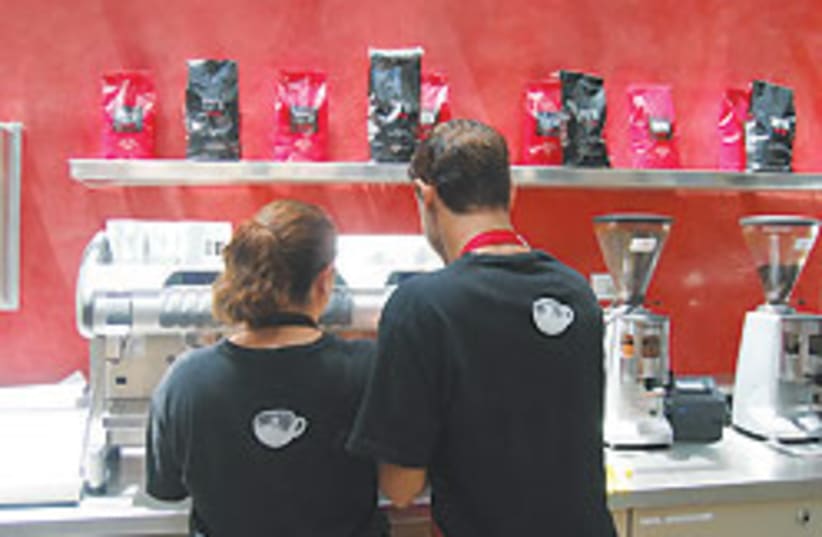Learning on the job
Aroma Applied, a non-profit cafe in Rehovot that employs some 45-50 at-risk teenagers, just celebrated its sixth anniversary.
Corporate social responsibility benefits everyone involved. Just ask the employees of Applied Materials, a global high-tech company that decided to do more than just drink coffee at the Aroma café located in its Rehovot office building. In June 2003, Applied Materials opened a non-profit café in partnership with Aroma Israel, the Ashalim organization for children at risk and the Havayot community center of Rehovot. The branch, called Aroma Applied, celebrated its sixth anniversary on June 24 and employs about 45-50 youth at risk, typically between 16 and 18. The café's work-training and educational programs equip these teenagers with professional skills, work experience and a supportive environment.
Applied Materials was initially approached by Ashalim's youth entrepreneurship program, It's a Deal, which wanted to set up a small business run by youth at risk. Coincidentally, Applied Materials had been looking to open a café for their staff. Aroma donated the franchise and continues to offer its products at a discount. Payments to suppliers, revenue and salaries are all managed by the Havayot community center, which is the franchise owner of the café. Because of its non-profit status, Aroma Applied essentially runs at a loss. At the end of each month, Applied Materials transfers this deficit to Havayot in order to cover costs.
"The moment you have a job," says Anthea Kessel, the Community and Public Relations Manager for Applied Materials, "you can develop commitment, responsibility and a normal social pattern."
While a regular job provides the structure that many of the program participants need, it is exactly this type of discipline that is developed gradually and with dedicated guidance. "The standard is obviously different [at Aroma Applied] because the people who work here are very young and not used to a professional environment. Often, the story is this [teen] cannot come in today and this one has a headache - commitment and discipline are not easy to learn," café manager Oren Pollack, who previously worked at a regular Aroma franchise, tells The Jerusalem Post.
Each shift, two of the teens are chosen as shift leaders, while others work in the kitchen or as waiters. Though the teens rotate jobs, some positions are more coveted than others, which creates a healthy dose of competition, according to Pollack. He explains that working in the kitchen is the most popular job. "If they give good service, smile and act nicely, which is a very difficult thing to do for some of these kids, they can be promoted to the kitchen," he says.
Zehava Shamshian, a Havayot social worker who has worked full-time with Aroma Applied for all its six years, is critical to the program's daily functioning. "There's a set model that we use to work with all the teens that is based on understanding boundaries and organization, but it's applied to each teen through an individualized curriculum," she says.
The young people arrive at Aroma Applied with an ability to trust others that varies. Their level of trust in others affects how Shamshian interacts with them. "It all depends on their experiences and relationships before they come here. They gradually learn how to trust through the open dialogue they need to have while working at the café," she explains.
The teens' relationships with their parents are also considered on an individual basis. Though some teens are close with their parents and some are not, Shamshian believes that most of the parents are proud of their children's involvement in the program and the independence they have achieved. "Many of the teens are helping their families economically, which strengthens their relationship with their parents," she adds.
According to Kessel, the goal of Aroma Applied is not to keep the teens in the program forever, but to eventually "send them out into the real world."
A condition of the program is that the teens participate in an individualized supplementary curriculum called Hilah. They meet one to three times a week with a tutor or in a specialized school. At the end of their studies, they sit for their matriculation exams. "Ninety percent of [them] enlist in the army," notes Shamshian. "Usually army service helps [them] define what they want to do professionally."
Applied Materials also offers scholarships to any program participant accepted to college or vocational school. Graduates who choose not to continue their education have successfully found work in other places, including regular Aroma franchises.
Though a few of the program participants attend school during the day and work at night, most no longer belong to the school framework. Aroma Applied serves as a replacement social network. "Without a doubt, every teenager needs a social life," says Shamshian. "It is crucial that the café fills this void in the teens' lives, especially since they are at an age where they are establishing their identity, which includes their social identity."
To ensure that they are socializing, the program organizes field trips, bike tours, night safaris, and even parents' evenings.
Shamshian explains that the most rewarding aspect of her job is watching youth who arrive devoid of confidence become self-assured, independent adults.
"I just heard about a teen who graduated from our program and opened his own business," she says.

